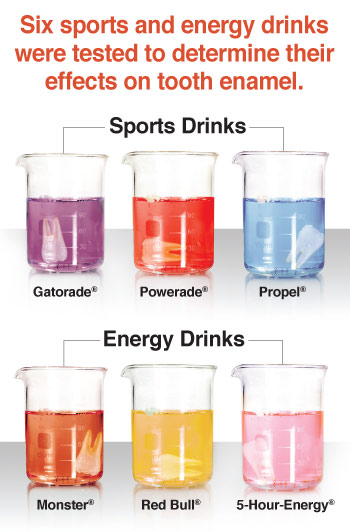Think Before You Drink
Sports And Energy Beverages Bathe Teeth In Erosive Acids
(Continued)
In The Lab
My colleagues and I tested a total of 22 beverages (13 sports drinks and 9 energy drinks) for three physical/chemical properties that affect the health of teeth:
Fluoride levels. Fluoride is a mineral that strengthens teeth. It can make teeth more resistant to acid attack, whether from decay or erosion, and can actually help repair areas of erosion in tooth enamel. That's why it's added to many public water supplies at optimal levels of 0.7-1.0 ppm (parts per million). Our study found that the mean fluoride level of sports drinks (0.281 ppm) was higher than that of energy drinks (0.165 ppm), yet both were much lower than the recommended optimal fluoride levels for drinking water.
pH. This measurement tells us how acidic or alkaline a solution is. The range is 0 to14, with neutral being 7 — about the normal level of saliva. The lower the pH level, the more acidic the solution is. The key here is that in the mouth, when the pH falls below 5.5, tooth enamel begins to dissolve, i.e., minerals begin to leave the tooth's surface. This enamel demineralization becomes even more pronounced when pH levels fall below 4.0. We found that the mean pH level of sports drinks (2.91) and energy drinks (3.05) were both well below these critical values, as is the pH level of soda. Various leading cola brands we tested in a prior study measured from pH 2.39 to 2.53.
Consumption of energy drinks would be expected to result in greater loss of tooth enamel than consumption of sports drinks. Testing this theory was our next step.
Titratable acidity. Without getting too technical, this measurement tells us about the concentration of the acid and therefore how easy or difficult it is to neutralize (buffer) it. The more concentrated the acid, the more erosive it is. Titratable acidity of a drink is therefore considered a better predictor of its ability to erode enamel than pH. Our study found a statistically significant difference between the titratable acidity of the sports drinks (3.58) and energy drinks (11.78) tested. Because energy drinks are about three times more resistant to buffering than sports drinks, consumption of energy drinks would be expected to result in greater loss of tooth enamel than consumption of sports drinks. Testing this theory was our next step.
Measuring Enamel Loss
Out of the 22 drinks tested for their physical/chemical properties, we chose six to test on the enamel of real teeth: Three sports drinks (Gatorade® Rain, Powerade® Option, and Propel® Grape) and three energy drinks (Monster® Assault, Red Bull®, and 5-Hour Energy®).

We took sections of enamel from real teeth that had been extracted for reasons unrelated to this experiment, and immersed each of them in one of the six drinks for 15 minutes. We then bathed each sample in artificial saliva for two hours. This step was important to simulate real-life conditions, as your saliva has the ability to buffer (neutralize) acids in your mouth.
The enamel samples underwent four cycles per day for five days and were stored in fresh artificial saliva when not being cycled through the sports and energy drinks. The beverage samples were replaced daily. This cycling mimicked the exposure of enamel to sports or energy drinks four times per day for five days. At the end of the cycling, we found that the enamel loss was significantly greater for energy drinks (3.1%) than sports drinks (1.5%). In other words, the enamel that had been exposed to energy drinks had eroded more than the enamel exposed to sports drinks — but both had been damaged.
We also found that titratable acidity was associated with more enamel loss at lower pH values. Therefore, a drink with high titratable acidity and low pH is a double whammy.

